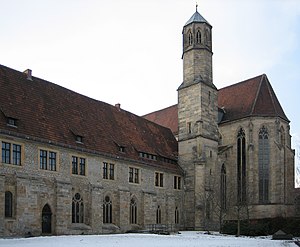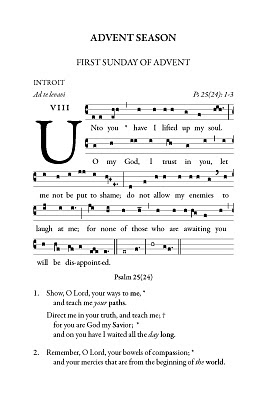Ronald Knox’s translation of the Bible is one of those things: either you love it or you hate it. In 1936, the Bishops of England and Wales asked this famous convert and literary man to translate the Scriptures from the Vulgate with an eye to the original languages. His New Testament came out in 1945 and the Old followed five years later. Its use was allowed for the Mass from 1965 to the early 1970s, making it one of the few translations approved for liturgical use which bridged the gap between the post-conciliar adjustments of what we now call the Extraordinary Form and the Novus Ordo.
I use the Knox translation when I double the readings in English at the EF, and for my private prayer. I hope one day someone will reprint a hand missal that uses the Knox version, so I can put it in my pews someday. I am a fan, but I do recognize that it is not everyone’s cup of tea!
Perhaps one of the most interesting things about Knox is that he wrote a little tome called Englishing the Bible in 1949 on the eve of the publication of his Old Testament. Some of it is self-defense against criticisms. But he also includes his thoughts on translation in general and why he went about things the way he did. I find it as fascinating as his Bible itself, and I only wish that the translators of the Septuagint, the King James Version and St Jerome had all written something similar.
What I want to do here is to re-produce some quotes from this little book with scant commentary. Now, I want to say from the outset that the reason for this article is not some kind of a veiled criticism against the current ICEL texts of the Mass nor of the Received Text or the Grey Book of the in-process English translation of the Roman Missal. I just find it interesting. Since I made my pocket money through the seminary by translating texts, and am now translating texts from Latin, French, Spanish, Italian and German into English as part of my dissertation, I am constantly faced with the same challenges with which Knox was faced on a daily basis. Of course, my dissertation will gather dust on a shelf of the University of Navarre. The Bible and the Missal are very different animals.
I also find that a lot of the acerbic discussion on the new translations has less to do with philology and translation methods than it does with the practical consequences of competing views of ecclesiology. Knox’s translation aroused much spirited debate, but I am not aware of anyone threatening apostasy or predicting the universal collapse of the Church in the English-speaking world because of it. It was also the casualty of the post-conciliar obsession with making everything new and different. Dare I suggest that the hermeneutic of continuity could be served by offering the Knox translation as an option for the OF Lectionary? But I digress.
Here are some fascinating quotes, for what they are worth.
“The great principle [Belloc] lays down is that the business of the translator is not to ask, ‘How shall I make this foreigner talk English?’ but ‘What would an Englishman have said to express this’?” p. 4
One notes that the English-speaking world is more than England. Translating a text that will be the same in Kuala Lumpur and Calgary is not so easy than one which will be used in both Portsmouth and Durham.
“The Authorized Version knew better, it was Douay, feverishly keeping the order of the Latin, that gave us the piece of false rhetoric to which our ears, by annual repetition, have grown accustomed.” p. 5
Here Know refers to the text, “If I by the finger of God cast out devils” whose emphasis, wrongly placed, could make it seem as if Jesus could also cast out angels. Anyway, it does seem that there is a long tradition of rendering English in a very Latinate way. It goes back to Douai at least!
“The first thing demanded of a new translation of the Vulgate is that it should break away from the literal translation of sentences.” p. 5
A clue to Knox’s methodology of translation. It is not the only method possible, as Liturgiam authenticam has a different one. Not better or worse, but different. At least there is a method to follow, in principle.
“Every translation of the Bible you have ever read makes errors which are quite as ludicrous –only we are accustomed to them. Douay was consistent; it translated the Latin word for word, and if you protested that its version sounded rather odd, replied woodenly, ‘Well, that’s what it says.’” p. 6
Consistency: not a bad idea for a translation. Also, we can become accustomed to certain turns of phrase!
“Where a form of words has become stereotyped through passing into liturgical use, it is a pity and probably a waste of time to try and alter it. The words of the Our Father and the Hail Mary have got to remain as they are.” p. 8
Knox died in 1957. I wonder what he would do about translating the Mass into English? He does observe that liturgical use trumps accuracy of translation. This is an important ecclesiological point, I think: The Bible does not norm the Church, but the other way around, at least in some sense. Discuss!
“It is a capital heresy among translators, the idea that you must always render so-and-so in Latin by such-and-such in English.” p. 10
As my friend Gregory says, Consistency is a virtue of small minds. Consistency is a virtue, except when it is a vice. Somewhat like anger.
“The translator who understands his job feels, constantly, like Alice in Wonderland trying to play croquet with flamingoes for mallets and hedgehogs for balls; words are forever eluding his grasp.” p. 11
I wonder how those over at Vox Clara feel about all this? They have invested their time and energy in this laborious process, and it is not easy. That alone merits sympathy, I say!
“Ought the modern reader of the Bible to have the illusion that he is reading something written in the twentieth century? Or will he prefer to have these holy documents wrapped up in archaic forms, just as he prefers to see the priest at Mass dressed up in a sixth-century frockcoat? The latter suggestion is not so improbable as it sounds.” p. 13
Many orations of the Mass are old. We do not celebrate Mass according to strictly Third Millennium ways of doing everything. Archaic language in some cases is not the same as archeologism. It connects us with the past.
“Much more serious was the problem, what to do about ‘thou’ and ‘you’. I confess I would have liked to go the whole hog and dispense with the use of ‘thou’ and ‘thee’ even where the Almighty is being addressed. They do these things in France, but I felt sure you could not get it past the British public.” p. 16
English-speaking people tend to think of God in a language which is more elevated and “churchy”, at least some of them. It is a cultural thing. It is something neither to be promoted or expunged at all costs, but neither can it be ignored.
“Why must the Catholic clergy spend so much of their time in explaining that the Bible doesn’t mean what it says?” p. 24
Shouldn’t we explain the meaning of the scriptural and liturgical texts in their relation to people’s lives instead of historical-critical-philological commentary?
“For centuries people have laughed at the old Douay version, because in Galatians v.4 it gave the rendering, ‘You are evacuated from Christ’. In 1940, what metaphor could be more familiar, or more significant?” p. 28
Sometimes these things take on a very real meaning in a circumstance. Just goes to show that the Words have power, even when those Words may seem a little weird!
“If you translate the Bible, you are liable to be cross-examined by everybody; because everybody thinks he already knows what the Bible already means.” p. 66
“Nobody reads the Bible; popes and bishops are always telling us to read the Bible, and when you produce a translation of the Bible, the only thing people complain about is your reading of the diminutive snippets that are read out in church on Sundays.” p. 92
Everyone has an opinion. And everyone has the right to express it. But not all opinions are equally valid. And, in the final analysis, given that no translation will ever be perfect, it seems to me that our opinions on the translation of anything, as meritorious as they may be, are not as important as the reality behind those words. The Word of God, expressed through Scripture in the Bible and the Tradition of the Church in the Mass, tells us that Jesus prayed that all may be one. The unity of our faith depends on putting criticism in its place – second to and in the service of the unity of the Church and the truth of Revelation.
Ronald Knox accepted a charge to do what most men would blanche at the thought of doing: translating the Bible so the Word of God, ever ancient and ever new, could move people’s hearts to love God. Knox, his supporters and his detractors, all knew one thing, however. They would still be in Church on Sunday morning for Mass, and they would still be in communion with Christ and their prelates. No manipulation of words would ever come between them and that. It is devoutly to be wished that the same recognition of the power of communion in truth that they had would capture the minds and hearts of all of us today.



